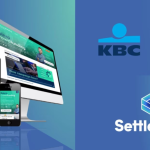Today KBC bank unveiled the Kate Coin, a blockchain-based e-money offering that can only be used via the KBC Mobile app. Its first large-scale test with 8,000 KBC employees takes place this weekend.
The bank was keen to distance itself from stablecoins given the closed-loop nature of Kate Coin. Initially, the coin can only be used to pay for KBC banking and insurance services, but it plans to partner with some of its enterprise customers and others to use it in the KBC Mobile ecosystem.
KBC said it is preparing for the future with its new offering, citing the new world of web3 and NFTs.
The in-house developed system has programmable money features. That means it’s possible to use code to control the money’s functionality, such as what it can be used to pay for during a specific time period. During this weekend’s trial, employees participating in the festival can use it to pay for snacks and drinks.
More generally, the functionality is initially restricted, so the coin is not transferrable between KBC customers, nor can it be exchanged for euros even though it is backed one for one in a segregated account. Instead, users will receive the coins for loyalty as rewards. For example, if someone purchases a particular product, invests in a socially responsible fund, or takes out a loan for an electric bike which is considered a sustainable activity.
“The customers who want to use the Kate Coin don’t have to do anything: they automatically receive the Kate Coins in their Kate Coin wallet in KBC Mobile and Kate (digital assistant) keeps them personally informed: why they receive Kate Coins, how long they can be used, etc,” said Erik Luts, Chief Innovation Office KBC Group.
The solution uses the enterprise blockchain Hyperledger Fabric with plans to host some of the nodes outside of KBC. “With the (Fabric) channels and private data collections we can keep confidentiality and comply with GDPR,” said Dirk Hermans, Innovation manager – blockchain lead at KBC via email.
Meanwhile, KBC has quite a bit of blockchain history, including as the instigator of we.trade. The trade finance platform backed by a dozen banks and IBM started insolvency procedures last week.
It’s also involved in another digital payments solution, Fnality. Owned by 15 major banks and the Nasdaq, in October Fnality is launching a platform that enables interbank payments backed by central bank money, starting with pounds sterling.








